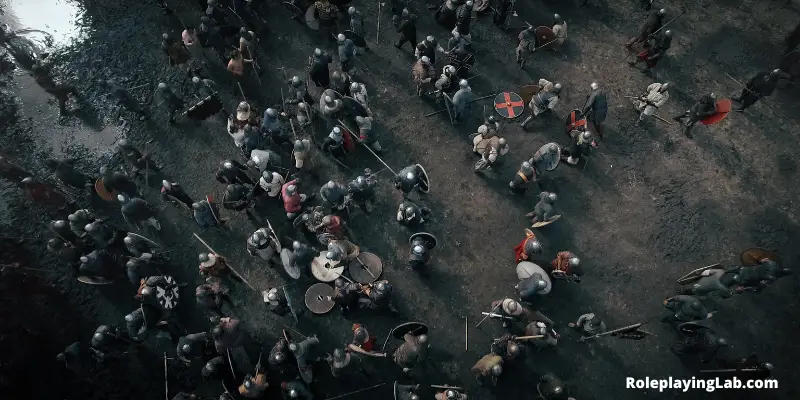Dungeons and Dragons (DND) is full of acronyms and abbreviations like HP, CR, and TPK.
What does TPK mean in DND?
TPK means “total party kill” in DND. A TPK is when the entire player group is wiped out by an enemy, plague, natural disaster, back luck, or inexperience. A TPK is rare in DND and is likely to result in shock, disbelief, and anger from the players. A TPK usually ends the current campaign.
Keep reading to find out everything you need to know about what TPK means in DND.
What Does TPK Mean in DND? (Detailed Answer)

Total party kills, or TPKs, are one of the most disruptive things that can happen during a DND session.
As the name suggests, a TPK occurs when the entire player group is eliminated at the same time. This is usually unexpected and can be caused by a variety of factors, from overconfident players to simple bad luck.
TPKs are rare, but they can have a profound impact on the game.
Not only are they emotionally devastating, but they also cause players to lose progress and can even lead to quitting the game entirely.
For these reasons, it’s important to try to prevent TPKs whenever possible.
And the best way to prevent TPKs is to understand the different types of total party kills.
5 Types of TPK in DND
There are five main types of TPKs in Dungeons and Dragons.
Here are the types:
- Enemy TPK
- Plague TPK
- Natural Disaster TPK
- Bad Luck TPK
- Inexperience TPK
What Does an Enemy TPK Mean in DND?
An Enemy TPK is when an enemy or group of enemies completely wipes out an entire party of player characters.
TPKs can occur for a variety of reasons.
But, usually, it’s because the party was simply outmatched by their opponents.
For example, if a group of first-level players is attacked by a grizzly bear, there’s a good chance that the bear will TPK them.
Of course, there are ways to prevent a TPK from happening.
A few ways to get around a TPK include using powerful magic or fighting defensively.
An experienced Dungeon Master (DM) will carefully craft enemy encounters for low-level players.
But sometimes even the best-laid plans fall apart, and an unfortunate group of adventurers meets their untimely end.
What Is a Plague TPK in DND?
A Plague TPK is when a disease takes out an entire group of D&D characters.
This is extremely rare, and usually only happens when a deadly poison or disease is included in an adventure without an available antidote.
In most cases, diseases in D&D are more of a nuisance than anything else, with characters suffering from a few minor symptoms before making a full recovery. However, there are some deadly diseases out there that can easily take down an entire party if they’re not careful.
One such disease is known as the “plague of Madness.”
This disease is particularly virulent and causes its victims to become aggressive and paranoid. In some cases, they may even suffer from delusions and hallucinations.
The plague of madness is often fatal, and there is no known cure.
Adventurers who find themselves up against this disease will need to be very careful, as even the slightest scratch from an infected creature could mean certain death.
Another deadly disease is the “Red Death.”
This disease causes its victims to bleed from their eyes, nose, and mouth before ultimately succumbing to death. The Red Death is a highly contagious and difficult disease to throw against your players.
If you’re planning on running a game with deadly diseases or poisons, be very careful and make sure your players are well-prepared.
Otherwise, a Plague TPK can ruin an otherwise great game.
What Does a Natural Disaster TPK Mean in DND?
Sometimes a DND party is killed by a natural disaster.
A Natural Disaster TPK is when a party is taken out by forces of nature, like an earthquake or tornado. These can be especially deadly if the party is caught unaware or unprepared.
Natural Disaster TPK can even be caused by the environment itself, like if the characters are caught in a lava flow or sinkhole.
Anytime a party is TPK’d by a dangerous environment, it is considered a Natural Disaster TPK.
What Is a Bad Luck TPK in DND?
A Bad Luck TPK is when unfortunate dice rolls lead to a Total Party Kill in DND.
Maybe a flying spell wears off too soon or a group of adventurers unexpectedly fail a saving throw and get crushed by falling rocks.
Whatever the case may be, a Bad Luck TPK can be a frustrating and disappointing way to end a game.
What Does an Inexperience TPK Mean in DND?
Even experienced players can make a few bad choices that lead to an unhappy ending.
But for inexperienced players, a TPK is even more likely.
A few bad choices can quickly snowball, leading to a party-wide wipeout. For example, a 2nd-level Halfling thief might think he can take on a group of mercenaries by himself.
He might think his sneakiness will allow him to get the drop on them.
But what he doesn’t realize is that their armor gives them a huge advantage in combat. The Halfling stands no chance against them and is quickly killed.
His death leads to the deaths of the rest of his party, resulting in a TPK.
Intentional TPK Vs. Unintentional TPK in DND (Differences Explained)
In Dungeons & Dragons, a TPK is a party wipe that can be an accident, or it can be intentional.
Either way, a TPK is always a dramatic event that can have lasting consequences for the group.
Here’s a look at the difference between intentional and unintentional TPKs.
Intentional TPKs are usually done by the DM as a way to end the campaign, or by a player who is disgruntled and wants to kill everyone off. Unintentional TPKs can happen when the party is simply unprepared for the challenge ahead, or when they make careless mistakes.
Intentional TPKs are usually done for plot reasons.
The DM wants to end the campaign, or the player wants to kill everyone off. Usually, there will be some warning signs before it happens, such as the DM dropping hints that things are going to get very dangerous.
In contrast, unintentional TPKs are often sudden and unexpected.
The party might make a few mistakes and find themselves in over their heads, or they might simply be caught off guard by a powerful enemy.
Regardless of how it happens, an unintentional TPK can be just as devastating as an intentional one.
How To Prevent a TPK in Dungeons and Dragons
In any game, but especially in Dungeons and Dragons, a Total Party Kill (TPK) can be a real party-killer (pun intended).
No one wants to see their hard work and imagination go up in smoke because of a few bad dice rolls.
Over the years, many DMs develop both instinct and tricks that help protect the players, sustain the game, and avoid the unthinkable.
How can a DM prevent a TPK?
The best prevention is solid DM preparation. When you design encounters in a DND session, really think about the possible consequences.
Have backup plans and help available for the players.
Also, be ready to improvise. If the players were weakened by the last encounter, make the next enemy weaker, too. Or reduce the number of combat encounters. Or give the player an NPC with a few special tricks up their sleeve.
If absolutely necessary, you can also fudge the DM dice rolls a little.
By being prepared and flexible, you can help ensure that your players will always have a fighting chance – even when the odds are against them.
What Happens After a TPK in DND?
As anyone who’s ever played Dungeons & Dragons knows, a total party kill (TPK) is one of the worst things that can happen during a game.
Not only does it mean the end of the adventure for everyone involved, but it can also lead to some serious emotional fallout.
After a TPK, the first thing that usually happens is shock.
Everyone asks themselves if what just happened was real. Did we really just get wiped out by that dragon? Did our characters really just die? Once the initial shock wears off, anger often sets in.
Players can get very attached to their characters, especially ones they’ve been playing for months or years. Losing a character can feel like losing a part of oneself.
Eventually, the players will come to accept defeat.
Character sheets might be scraped and some players might even leave the group, but there is usually a rapid-fire venting of feelings.
Essentially, everyone at the DND table just suffered emotional and psychological trauma.
It’s important to recognize, validate, and process those powerful emotions so that the group can move forward.
How To Handle a TPK in DND
Inevitably, there will be times when a group of players is completely wiped out in Dungeons and Dragons.
When this happens, it’s important to take a few moments to allow the players to express their feelings and figure out how they want to proceed.
From there, the Dungeon Master also has a few options.
They can reverse the TPK, launch an afterlife adventure with the players to try to get their lives back, or start an entirely new campaign from scratch.
Personally, I prefer to use the TPK as an opportunity to reset the campaign and start fresh with new characters. This allows everyone to have a clean slate.
However, ultimately it’s up to the DM and the players to decide what will work best for their group.
Here is a good video about how to manage the aftermath of a TPK in DND:
Final Thoughts: What Does TPK Mean in DND?
As much as we’ve gone over ways to avoid Total Party Kills, they are not all bad.
The risk of a TPK makes DND more fun and engaging.
We have a ton of other articles about DND on our site. Check out a few more before you go!
Related posts:
- What Does DC Mean in DND? (Ultimate Guide for Beginners)
- Why Do Most DND Campaigns End Well Before Level 20? (Solved)
- What Is a Group of Dragons Called? (Answered & Explained)
Resources
Frontiers in Psychology (Research on group trauma)
